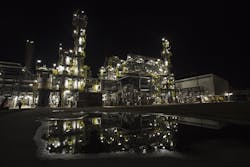OMV Petrom increases bioblending at Petrobrazi refinery
OMV Petrom SA, Bucharest, has completed a project to boost bioblending capacity as well as improve infrastructure for transport, unloading, and storage of biocomponents at its 4.5-million tonnes/year Petrobrazi refinery in the southeast region of Romania, near Ploiesti City.
Initiated in 2018 and completed at an investment of about €21 million, the project has increased blending capacity of biocontent in fuels produced at the refinery to about 350,000 tpy from 200,000 tpy in alignment with European regulations requiring the renewable energy content in transportation fuels to increase to 14% in 2030 from 10% in 2020 as part of its program to reduce greenhouse gas (GHG) emissions arising from the transportation sector, OMV Petrom said on Nov. 18.
OMV Petrom—which disclosed no further details regarding work involved during the project—said the Petrobrazi refinery now supplies fuels with a volumetric biocontent of 6.5% in diesel and 8.0% in gasoline.
“We are investing in obtaining fuels with a high level of biofuel content, as well as in alternative solutions for mobility and in various others sustainable projects,” said Radu Căprău, OMV Petrom executive board member responsible for the operator’s downstream business.
The increase in bioblending capacity at Petrobrazi comes as one component of a combined effort across all levels of OMV Petrom to meet a goal of reducing its carbon emissions 27% by 2025 vs. the 2010 baseline year, according to Căprău.
OMV Petrom—a member of the United Nations Global Compact since 2013, and which in July 2020 announced its support for recommendations issued by the Task Force on Climate-related Financial Disclosures (TCFD) regarding risks and opportunities on climate change—said its investments since 2005 at the Petrobrazi refinery have totaled €1.8 billion, a third of which has been dedicated to projects aimed at reducing environmental impacts.
Investments to reduce the environmental impacts at the refinery include a €46-million project completed in 2019 at the coker, where the unit’s outdated closed-blowdown system was replaced with a new one equipped with best available technologies for recovery of hydrocarbon vapors to ensure complete elimination of any emissions of potential volatile organic compounds, according to the operator’s 2019 annual report to investors.
OMV Petrom in 2019 also completed startup of a new €65-million Polyfuel unit that—using environmentally friendly technology—has allowed the Petrobrazi refinery to shift as much as 50,000 tonnes of its current production of LPG components into Euro 5-quality gasoline and diesel (OGJ Online, Apr. 23, 2019; Dec. 21, 2016).
In its 2019 sustainability report, OMV Petrom said it also was making an unspecified investment in a project at Petrobrazi to enable the refinery to coprocess about 90,000 tpy of vegetable and used cooking oils by 2025.
As of yearend 2019, OMV Petrom’s sustained investments across the entirety of its businesses have reduced carbon emissions of operations by 22% vs. 2010, according to the company.
About the Author
Robert Brelsford
Downstream Editor
Robert Brelsford joined Oil & Gas Journal in October 2013 as downstream technology editor after 8 years as a crude oil price and news reporter on spot crude transactions at the US Gulf Coast, West Coast, Canadian, and Latin American markets. He holds a BA (2000) in English from Rice University and an MS (2003) in education and social policy from Northwestern University.

